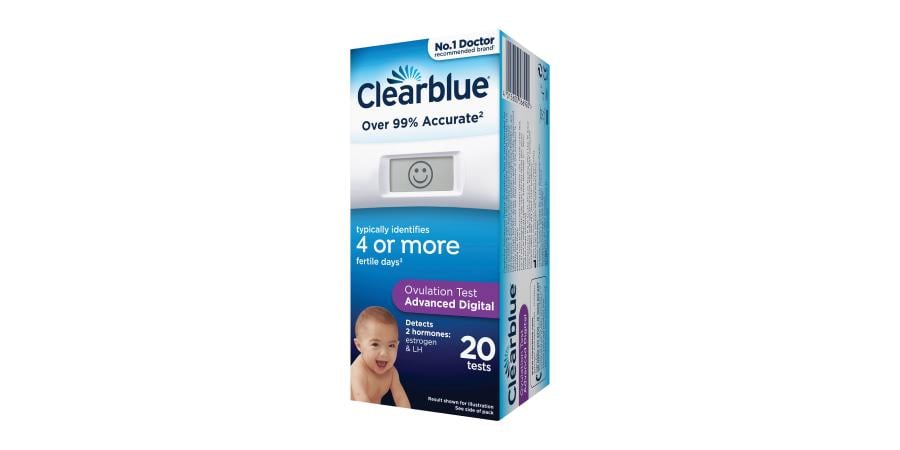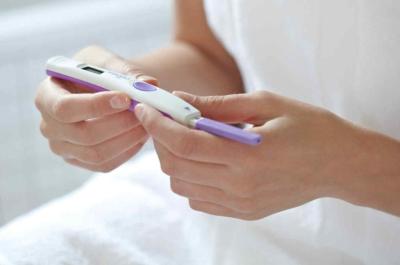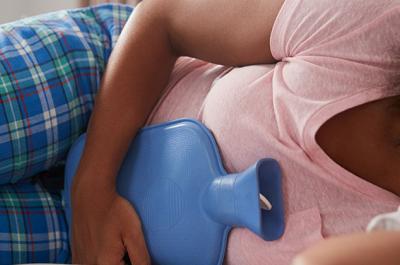
Deciding it’s time to start a family, or planning to get pregnant again? Get expert advice to help you conceive and begin a healthy pregnancy. Here is our Top 10 list of things to know:
In this article
- 1. Stop contraception
- 2. Have sex at the right time
- 3. Optimise vaginal health – use a sperm-friendly lubricant
- 4. Take folic acid
- 5. Eat healthy foods
- 6. Avoid certain foods
- 7. Stay fit and maintain a healthy body weight
- 8. Stop smoking, recreational drugs, alcohol
- 9. Get your rubella vaccination
- 10. Get your partner involved - here are some ways to help him create healthy sperm
- It can take some time for your menstrual cycles to return to normal after stopping contraception.
- Timing sex based on when you ovulate will help you get pregnant faster.
- One in two couples could be trying to get pregnant at the wrong time1.
- Clearblue Ovulation Tests can help you find the days when you are most fertile each cycle
1. Stop contraception
With some methods of contraception, such as the male and female condom, the cap, diaphragm and natural family planning, when you stop using the contraception your menstrual cycles and your fertility will not be disrupted. With other methods, such as the combined contraceptive pill and contraceptive injections, it can take some time for your menstrual cycles to return to normal after stopping the contraception. Although there is no reason you can't start trying for a baby immediately, some women like to wait a few months before trying, to re-establish their natural cycles and prepare their body fully.
2. Have sex at the right time
Did you know that one in two couples could be trying to get pregnant at the wrong time1? There are only a few days each month when a woman can become pregnant; having sex on the day of ovulation (when your body releases an egg) or the few days leading up to ovulation will maximise your chances of becoming pregnant.
At some point, you’ve probably heard that the average cycle is 28 days long, and that ovulation occurs on day 14. Both of these numbers are just averages from reported data. In reality, most women’s cycles don’t match this “average”. Tracking with an ovulation test will help you identify your individual cycle length and date of ovulation, not just a guess.
3. Optimise vaginal health – use a sperm-friendly lubricant
Vaginal dryness is more common than we may think. In a study across 11 countries involving over 6,500 women, up to 18% of women aged 18–34 years reported always or usually experiencing vaginal dryness4. This can be worse when trying to conceive as there is a tendency to have lots of baby-making sex. Some of the most commonly available lubricants can be harmful to sperm – so be sure to use a sperm-friendly lubricant.
If you have any abnormal vaginal discharge, it is worth speaking to your doctor. Common vaginal infections, such as bacterial vaginosis or thrush, can be treated easily and make trying for a baby easier.
4. Take folic acid
Taking a folic acid supplement helps prevent neural tube defects in your baby such as spina bifida. For example, in the UK the Government's Chief Medical Officer recommends that women planning to get pregnant, or women who are pregnant, take a folic acid supplement containing 400 micrograms of folic acid every day, ideally starting three months before you start trying to conceive, and throughout the 1st trimester of your pregnancy2. If you eat a healthy diet, you will already get some folic acid from foods such as fortified breakfast cereals, beans, leafy green vegetables and orange juice, but it is important to still take supplements because it is very difficult to get the required folic acid amount through diet alone.
5. Eat healthy foods
To give your baby the best start, even before conception it’s a good idea to eat regular, balanced meals, lots of fresh fruit and vegetables and cut down on processed and 'fast' food. Make sure your diet includes:
- Carbohydrates - wholemeal (brown) bread, pasta, rice and cereals are better than white bread, cakes and biscuits
- Fruit and vegetables - try to eat five portions a day, bearing in mind that the more colourful the fruit or vegetable, the more nutritious it is.
- Protein - you can get the protein you need from meat, fish, eggs, pulses and beans.
- Milk and milk products - these contain lots of calcium, which is important for bone development
- Fat - try to get your fat intake from vegetable sources like olive oil, or oily fish like salmon, herring or mackerel
6. Avoid certain foods
- Raw eggs and raw or undercooked meat or shellfish
These may contain salmonella or other organisms which can cause food poisoning - Unpasteurised dairy products, liver or liver pâté and leftovers
These foods can contain Listeria, which can lead to miscarriage or stillbirth. - Liver/liver products
These contain high levels of vitamin A, which may be harmful for a developing baby so should be avoided. - Vitamin supplements not labelled "For Use in Pregnancy"
Vitamins and other supplements should only be used if it says on the container they are safe to use in pregnancy. This is because some vitamins, if taken at high levels, are very dangerous for the developing baby. It is important to take folic acid as mentioned earlier, so either buy this as a single supplement or buy a supplement designed specifically to be used in pregnancy. - Be careful with medication
Discuss any medication you're taking with your doctor and also, make sure you speak to your doctor before stopping any prescribed medication you are taking. Let the pharmacist know you're pregnant if you need any over-the-counter medicine. Even simple remedies like decongestant nasal sprays can contain ingredients that should not be used when pregnant. - Be aware of toxoplasmosis
Unwashed vegetables, undercooked meat and cat faeces carry the risk of toxoplasmosis – which can cause miscarriages, stillbirth or damage to your baby. So always wash fruit and vegetables, only eat thoroughly cooked meat and wear gloves when you're gardening or emptying cat litter trays.
7. Stay fit and maintain a healthy body weight
Pregnancy puts a lot of strain on your body so getting fit before pregnancy will help you after you conceive. If you're fit before you get pregnant, it will be easier for you to stay active when you are pregnant. Exercise can help to improve your mood and energy levels. It, also reduces stress, which is a good thing when it comes to conceiving. Being a healthy body weight can help you to get pregnant, so the best thing is to try and achieve as ideal a weight as possible before trying to get pregnant. Your doctor will be able to give you information about a healthy weight for you.
8. Stop smoking, recreational drugs, alcohol
It's best to avoid smoking, recreational drugs and alcohol while you are trying to get pregnant and throughout your pregnancy.
If you smoke or take recreational drugs then giving up will improve your chances of having a healthy pregnancy and a healthy baby.
Drinking in pregnancy can lead to long-term harm to your baby, with the more you drink the greater the risk. If you are pregnant or planning a pregnancy, the safest approach is not to drink alcohol at all, to keep risks to your baby to a minimum. If your partner smokes, drinks or takes drugs then it is also important that they cut down on these substances (and ideally, stop them altogether) while you are trying to get pregnant. Apart from the secondary effects on you, cigarettes, recreational drugs and alcohol can all have an adverse effect on the quality of sperm.
9. Get your rubella vaccination
Rubella, also known as German measles, can seriously affect unborn babies. It's a good idea to check that you're fully protected against rubella if you're planning to have a baby. Talk to your doctor about your vaccination history3.
10. Get your partner involved - here are some ways to help him create healthy sperm
- Stay fit and healthy
Your partner should try to be as active as possible, reduce alcohol, stop smoking and eat a healthy diet. - Use sperm-friendly lubricant
Make sure any lubricant you use isn't 'spermicidal' or toxic to sperm. You can buy 'sperm-friendly' lubricants that are specially formulated. - Keep testes cool
Your partner should wear loose underwear and avoid hot baths. Consistent or prolonged 'heating' of the testes can reduce sperm quality.

Answers from our Experts
Professor William Ledger is Professor and Head of Department of Obstetrics and Gynaecology
at the University of New South Wales in Sydney Australia
I’ve recently stopped using hormonal contraception (e.g. the contraceptive pill). Will this affect the results of my ovulation test?
No, it will not affect your results. However, your cycles may be irregular and can take some time to stabilise. You may wish to wait until you have had two natural menstrual cycles and note their length before using a Clearblue Ovulation Test.Can certain sexual positions, such as laying on your back with your legs in the air after sex, increase your chances of conceiving?
Professor William Ledger, Fertility Specialist
This seems to be an old wive’s tale. Many women notice that semen seems to 'leak back' from the vagina after intercourse and so lie on pillows or with their legs in the air after sex, when they are trying to conceive. The leakage that you may notice after sex is just the seminal fluid - the motile sperm move very rapidly into the cervical mucus. So, don’t worry about this leakage.
Why is folic acid recommended when trying for a baby?
Professor William Ledger, Fertility Specialist
There is good evidence that having a good level of folic acid in the bloodstream at the time of conception substantially reduces the risk of the baby having neural tube defects such as spina bifida. Public health authorities in UK, USA and elsewhere recommend that healthy women take 0.4 or 0.5 mg folic acid per day (this is available in many pre-pregnancy vitamin supplements) and those with risk factors for poor folic acid metabolism, such as women taking anti-epileptic drugs or with MTHFR gene mutations should take 5.0 mg per day. What is important is to have it in the egg before it is fertilised.
We are planning to try for a baby, are there any dietary supplements apart from folic acid that can help me?
Professor William Ledger, Fertility Specialist
Folic acid is the most important. However, it’s worth having your vitamin D level checked and taking a replacement if you are deficient (which many of us are). If you have a diet that is light in red meat then you may need an iron supplement and if you have a vegan diet then other supplements may be worth considering. However, there is a large industry designed to sell vitamins and supplements to women wanting to be pregnant, and there's not much evidence that healthy young people with a balanced diet need to take all of these potions.
Are there any foods I should avoid when trying for a baby?
Professor William Ledger, Fertility Specialist
Most foods are completely harmless during pregnancy and it's important to maintain a balanced healthy pregnancy diet with sensible amounts of the various nutritional categories. However, there are worries at present about listeria infection that can be caught from unpasteurised and raw foods. These include unpasteurised milk, soft cheeses, pre-prepared salads (for example, from salad bars), unwashed raw vegetables, pate, cold diced chicken and pre-cut fruit and fruit salad. To prevent listeriosis avoid these high-risk foods and thoroughly cook raw food from animal sources, such as beef, lamb, pork, or poultry, keep and prepare raw meat separate from vegetables, cooked foods, and ready- to-eat food and wash raw vegetables and fruit thoroughly before eating.
We are planning to try for a baby, are there any dietary supplements that my partner should be taking?
Professor William Ledger, Fertility Specialist
Not unless he has specific health problems or has dietary restrictions. If you've been trying for a while its worth asking your doctor to arrange a sperm count for him - if this is normal then don’t worry about supplements. Stop smoking, drink moderately on no more than two or three occasions per week, keep your weight in the normal range for your height (but don’t lose too much) and enjoy a happy love life.
As we are trying for a baby, should we increase our frequency of intercourse? Can too much intercourse damage the quality or quantity of the sperm?
Professor William Ledger, Fertility Specialist
Sperm that are stored within the testicles for too long accumulate damage to the DNA and are less fertile. With couples who have frequent (daily) intercourse, the man will have a lower sperm count per ejaculation but the sperm will be more fertile. If you are trying to conceive then try to have intercourse at least every other day around the time of ovulation.
- Johnson SR., et al. Hum. Repro. (2011) 26: i236
- Leiblum SR., et al. J Sex Med. (2009) 6: 2425–2433.
- http://www.nhs.uk/Conditions/Rubella/Pages/Prevention.aspx accessed 2/5/2017
- NICE Clinical Guideline [CG62] – Antenatal care for uncomplicated pregnancies. Published March 2008. Updated January 2017.
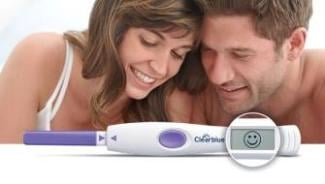
Advanced Digital Ovulation Test
In every cycle there are only a few days when a woman can conceive, so having sex on these days is very important if you are trying to get pregnant. The Clearblue® Advanced Digital Ovulation Test is the first and ONLY test that typically identifies 4 or more fertile days each cycle.
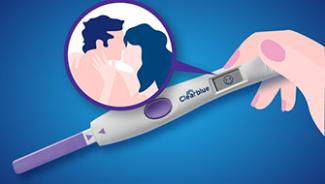
Find your most fertile days
Ovulation tests are an accurate and simple way to identify your most fertile days to maximise your chances of getting pregnant.


